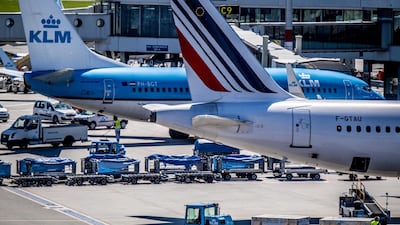Air France-KLM said operating profit rose 16 per cent in the second quarter as new chief executive Ben Smith's cost-cutting helped offset rising fuel prices.
The Franco-Dutch group has lagged behind European rivals on profitability in recent years but delivered a stronger quarter than rival Lufthansa, which reported a 25 per cent earnings fall on Tuesday as increasing capacity intensified competition.
Operating income rose to €400 million (Dh1.63 billion), ahead of the €316m expected by analysts, according to the company's own poll of 20 estimates.
Better sales and "execution in unit-cost reduction enabled us to more than offset rising fuel costs", Mr Smith said. A 6.1 per cent increase in Air France-KLM traffic outpaced its 4.5 per cent capacity expansion year-on-year.
Mr Smith, who joined Air France-KLM last September from Air Canada, wants to boost efficiency through better co-ordination of the Air France and KLM networks and fleets while expanding services under the Transavia low-cost brand.
Revenue rose 6.4 per cent to €7.05bn, while unit costs fell 2.3 per cent excluding currency and fuel costs, which rose by €220m year-on-year.
Further gains on efficiency will come from simplification of the business as well as recent labour deals that mean Air France-KLM has "enormous flexibility now to drive productivity gains", Mr Smith said. The new chief executive has pledged to give investors a detailed strategy presentation in November.
Long-haul bookings for August-December are ahead of their level a year earlier, the company said.
"Forward bookings suggest the long-haul outlook remains encouraging, although we would expect further short-haul challenges," Liberum analysts said.
The operating margin improved to 5.7per cent from 5.2 per cent, largely reflecting the impact of Air France strikes a year earlier that led to the abrupt departure of Smith's predecessor.
Air France pilots overwhelmingly approved plans to expand Transavia's fleet beyond the 40-plane limit currently imposed by labour agreements, Mr Smith announced on Wednesday, hailing the SNPL union members' 78 per cent referendum vote as a "big positive".
In a sign of remaining hurdles, however, Air France-KLM trimmed its Transavia capacity growth forecast for 2019 to 7 to 9 per cent, from 9 to 11 per cent, citing pilot recruitment delays.
Unit revenue rose across all major long-haul regions except crisis-hit Latin America, with the lucrative North Atlantic market showing 2.6 per cent growth before currency effects. North America will show a smaller improvement for the third quarter underway, chief financial officer Frederic Gagey predicted.
Net income fell 27.3 per cent to €80m. Debt declined by €466m over six months to €5.7bn.
The fuel-cost impact reflected the expiry of hedging instruments that had benefited the group last year, Mr Gagey said. For the full year, however, Air France-KLM trimmed the expected fuel bill increase to €550 million from a previously forecast €650m.
To improve fuel-efficiency and costs, Air France-KLM said on Tuesday it will buy at least 60 Airbus A220s to replace ageing aircraft and retire all 10 A380 superjumbos from its 541-plane fleet earlier than planned, a decision that will incur about €400m in future writedowns, the CFO said.
Air France-KLM also reiterated its 2019 goals including a unit-cost progression between flat and a 1 per cent decline before fuel – a benchmark surpassed by a 1.4 per cent decline in the first half.

